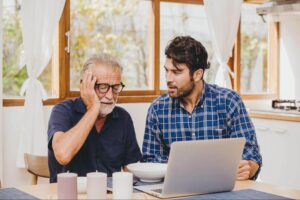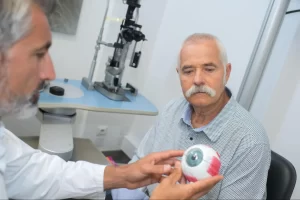Picture this: the day of the solar eclipse, the sky slowly darkens as the moon begins to cover the sun. You can’t help but get excited—you’re about to witness a rare, beautiful event. But then, you pause and wonder: “Are my solar eclipse glasses safe enough to use?
You may have seen people trying to make their own eclipse glasses or considered using the pair you found online. But the big question is: Are those glasses really safe for your eyes?
It’s easy to get caught up in the excitement, but protecting your eyes is no joke. Let’s discuss the truth behind homemade eclipse glasses versus certified solar eclipse glasses. Keep reading to learn how to safely enjoy this amazing experience without worrying about your vision.
Homemade Eclipse Glasses: Are They Safe?
What Are Homemade Eclipse Glasses Made Of?
Thinking about going the DIY route and making your own eclipse glasses? You might be tempted to grab whatever materials you have lying around—paper, plastic, maybe even old sunglasses. But here’s the thing: homemade eclipse glasses aren’t all made the same, and a lot of them won’t keep your eyes safe.
Things like paper or plastic without the right kind of filter won’t do much to block out the harmful UV rays and bright light from the sun. And that’s exactly what you need when viewing an eclipse. Without proper protection, your eyes could be in serious trouble.
The Risks Of Using Homemade Eclipse Glasses
You might be wondering: What’s the big deal with homemade eclipse glasses? It’s just a fun project, right? Well, here’s the truth—if your homemade glasses don’t meet certain safety standards, they can put your eyes at risk.
Even though you might think you’re protecting your vision, your eyes could still be exposed to the harmful rays that come from staring at the sun during an eclipse. The biggest concern is something called “eclipse burn,” which is like a sunburn but for your eyes. And trust me, you don’t want that.
It’s just not worth the risk to use homemade glasses when there are so many safe, ready-to-use options out there.
Ensuring Homemade Eclipse Glasses Meet Safety Standards
If you’re really determined to make your own eclipse glasses, there are a few things to consider. You’d need to make sure your materials meet some very specific safety standards. For example, the filters you use should be ISO-certified and tested for eye safety. But here’s the catch: it’s tough to get DIY glasses to meet these standards.
Instead of taking on the challenge of building your own glasses, why not go for something that’s already tested and guaranteed to keep your eyes safe? That way, you can focus on enjoying the eclipse without worrying about your vision.
Solar Eclipse Glasses: What You Need to Know
Solar eclipse glasses are built for one thing: protecting your eyes while you watch the eclipse. Unlike regular sunglasses or homemade glasses, they’re made with special filters that block out harmful ultraviolet (UV) rays and cut down the sun’s brightness so it’s safe to look at.
When shopping for eclipse glasses, look for one very important thing: the ISO certification. That means the glasses have been tested to ensure they’re safe for direct sunlight exposure. These glasses are the real deal when it comes to protecting your eyes.
Choosing The Right Pair Of Eclipse Glasses
With so many options on the market, how do you know which pair of eclipse glasses to pick? Start by looking for glasses that have a clear ISO certification label. This means they’ve passed the necessary safety tests.

Make sure you also check for any damage to the lenses. Scratches or cracks can compromise the glasses’ ability to protect your eyes. A fresh, undamaged pair is what you need to keep things safe.
The Importance of Using ISO-Certified Glasses
Why is ISO certification so important? It ensures the glasses meet the strict standards for eye protection. Solar eclipse glasses are made to block out 99.99% of harmful UV rays and reduce the sun’s brightness to a safe level.
If you’re going to take the time to watch an eclipse, it only makes sense to use glasses that have been thoroughly tested to keep your eyes safe. Don’t gamble with your eyesight—go for glasses that you can trust.
What Happens During a Solar Eclipse?
The Phases of a Total Solar Eclipse
A solar eclipse doesn’t just happen all at once. It comes in phases, and knowing what happens during each phase will help you understand when it’s safe to look without your eclipse glasses.
First, we have the partial eclipse, when the moon starts to cover the sun. At this point, it’s tempting to take a peek, but don’t—remember, the sun is still dangerously bright, and you need to have your eclipse glasses on.
Then, there’s the total eclipse, also known as totality. This is the only time it’s completely safe to look directly at the sun with no protection. But don’t blink because totality doesn’t last long! As soon as it’s over, you need to put those glasses back on.
The Risks of Viewing Without Proper Protection
It might seem safe to take a quick glance without your glasses, especially during the partial eclipse. But even a second of looking at the sun without proper protection can cause serious harm. Your retina can burn, leading to permanent vision loss. It’s just not worth the risk.
That’s why it’s so important to keep those eclipse glasses on during the partial eclipse phases. It only takes a moment to cause serious damage, and you don’t want to regret it later.

How To View The Eclipse, Safely
It’s one thing to have the right pair of solar eclipse glasses, but it’s also important to wear them correctly. Make sure they fit snugly on your face, and there are no gaps where light can sneak through. You want full protection, so don’t skimp on the fit.
Also, don’t forget to check your glasses before use. If they’re scratched or damaged in any way, get a new pair. Your eyes deserve the best protection!

Besides eclipse glasses, there are other safe ways to enjoy the eclipse, like using solar viewers or eclipse shades. While these are good options, nothing beats the simplicity and safety of a certified pair of eclipse glasses.
But remember, even with additional tools, those eclipse glasses are still the most reliable way to keep your eyes safe. Stick with what works best!
Don't take chances with your eyesight—ensure your solar eclipse glasses are safe and reliable. Contact us to get the best protection advice for your eyes!
The Key Differences Between Homemade and Professional, Certified Eclipse Glasses
Let’s be honest—there’s no comparison between homemade eclipse glasses and professional, certified ones. Homemade glasses might seem like a fun idea, but they can’t match the quality and protection of glasses made for this specific purpose.
Certified solar eclipse glasses are designed to block harmful UV rays and cut down on the brightness of the sun to safe levels. Homemade glasses? Not so much. Protecting your eyes is too important to take chances.
Also, professional solar eclipse glasses come ready to use and don’t require any extra work. But with homemade glasses, you might find yourself cutting, taping, or hoping the materials hold up. It’s a lot more effort and risk when you could just use something safe and ready-made.
With certified glasses, you get peace of mind knowing your eyes are in good hands.
How to Prepare For The Next Total Solar Eclipse
Get Your Glasses Early
Don’t wait until the last minute to get your eclipse glasses! They tend to sell out quickly as the event approaches. If you get yours ahead of time, you’ll avoid the rush and have a guaranteed pair that you know is safe.
Check the Safety Information Before Use
Before you even think about using your eclipse glasses, make sure to double-check the safety information. Look for the ISO certification, inspect the lenses for any damage, and ensure everything’s in good shape. This little bit of extra care will ensure your experience is worry-free.
Keep Your Eyes Healthy With 414 Eyes
At 414 Eyes, we understand that safeguarding your vision is essential every day, not just during solar events. As experienced Milwaukee optometrists, we’re dedicated to providing the right tools, expert guidance, and personalized care to help you maintain clear, healthy eyesight year-round.
In addition to a diverse range of prescription eyeglasses and contact lenses we also provide a full range of eye care services such as macular degeneration testing, glaucoma management, dry eye treatment, and myopia control. Whether you need advice on how to safely watch a solar event or are just in need of a comprehensive eye exam, we are here to guide you through every step, ensuring your vision remains clear and protected.
Schedule a consultation today and let us guide you in keeping your eyes healthy for years to come!
FAQs
How can I get solar eclipse glasses before an event?
You can purchase solar eclipse glasses online or from trusted retailers. It’s essential to buy them in advance to avoid last-minute stress. Many brands manufacture these glasses with proper solar filters to ensure safe viewing, and they are available in various packaging options, including individual boxes or bulk purchases for larger events.
What materials should I look for in solar eclipse glasses?
Look for solar eclipse glasses made with durable materials that provide proper solar filtering. Glasses with solar filters must be manufactured to block harmful UV and intense visible light. These filters should meet ISO certification standards, ensuring the protection of your eyes while viewing the eclipse in a safe manner.
How can I make sure my solar eclipse glasses are trustworthy?
Ensure your solar eclipse glasses come from a reputable brand with clear safety instructions and CE certification. Check that they have been independently tested for safety and are designed with proper optical density. You should also avoid using damaged or expired glasses, as they may not provide the necessary protection.
How long do homemade eclipse glasses last?
Homemade eclipse glasses might not be as durable as professionally manufactured solar eclipse glasses. The longevity of DIY glasses depends on the materials used and how well they are stored. For safety, it’s recommended to drop diy glasses and use certified solar eclipse glasses that meet ISO safety standards.
Can solar eclipse glasses be used multiple times?
Solar eclipse glasses are meant for single use during a solar event. However, if they are stored and handled carefully, certain types of eclipse sunglasses or solar filters may be used for multiple events. Always check for wear and tear before reuse to ensure your eyes remain protected during the solar event.
Is it safe to view a solar eclipse using a white sheet as a filter?
Using a white sheet is not a recommended method for safely viewing a solar eclipse. Solar eclipse glasses with proper solar filters are essential for protecting your eyes during the event.
What if I accidentally create a hole in my solar eclipse glasses during viewing?
If you notice any damage, like a hole or crack, during the eclipse, it’s important to stop using those glasses immediately and replace them. Even small imperfections can compromise eye protection.
What kind of reviews should I look for when buying solar eclipse glasses?
Look for reviews that focus on the quality, safety standards, and comfort of solar eclipse glasses. Positive reviews often highlight trusted brands with ISO certifications, ensuring you receive a safe product.



